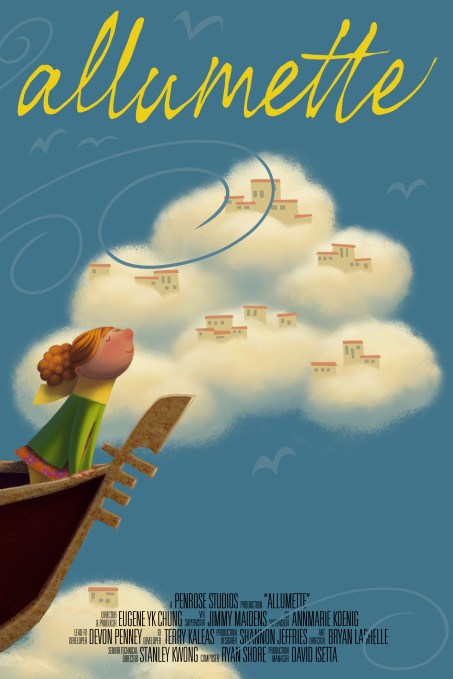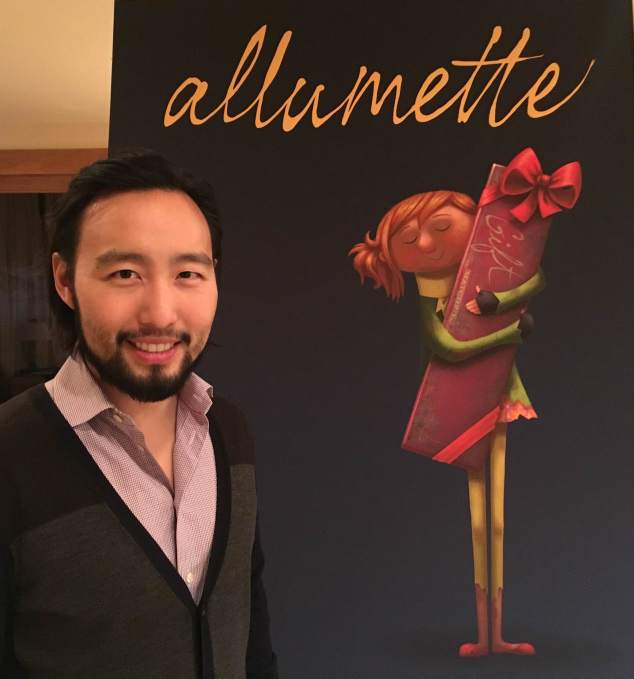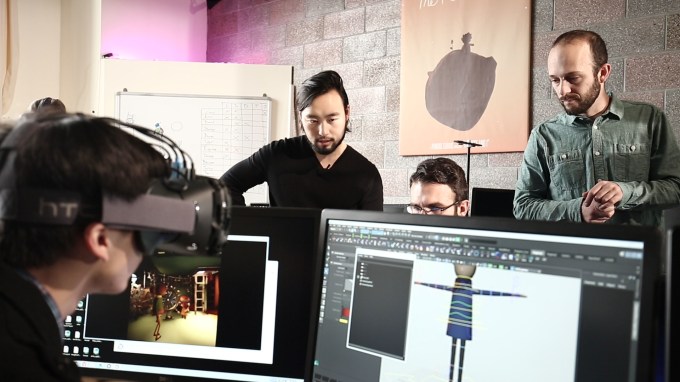There are advantages to being an invisible giant in a virtual world. You can watch over a whole town or lean in to see the miniature protagonist’s face. You’re so big you never worry about something bumping into you, so you can get as close to the tiny action as you want.
And it disarms the Swayze Effect — the disappointment that virtual characters can’t see or interact with you, named after Patrick Swayze in the film Ghost. Instead you understand yourself to be some enormous, omniscient observer not meant to influence the plot.
 These are just a few of the tricks devised by Penrose Studios to take virtual reality from a technology demo to a storytelling medium. Last year it previewed its first VR short film, “The Rose And I”, an adaptation of French children’s book “The Little Prince”, in which the adorable inhabitant of soccer ball-sized planet meets an emotive flower.
These are just a few of the tricks devised by Penrose Studios to take virtual reality from a technology demo to a storytelling medium. Last year it previewed its first VR short film, “The Rose And I”, an adaptation of French children’s book “The Little Prince”, in which the adorable inhabitant of soccer ball-sized planet meets an emotive flower.
Now, Penrose has let a lucky few check out the 10-minute teaser trailer to its next work, “Allumette”, about a girl selling magical matchsticks in a town floating in the clouds.
Both are gorgeous, enveloping, sensitive, and pioneering in how they use technology to evoke simple narratives that will tug anyone’s heartstrings. Most virtual reality content today simply explores and tests boundaries. You’re transported under the sea or to a mountain top, into outer space or some psychedelic innerspace.
But Penrose just wants you to empathize with its characters, to feel something. That’s why Penrose Studios is the Pixar of VR.
Technological Storytelling
It helps that Penrose was founded by Eugene Chung, who actually worked in production at Pixar. His mother was an accountant and his father was an opera singer, which he tells me gives him a sense of “this duality of the left brain – right brain”. Chung has spent his life combining technical details with emotion to tell stories on the frontier of new mediums.

Penrose Studios founder and CEO Eugene Chung
Chung went on to co-create Oculus Story Studio, the hardware maker’s foray into content, designed to “educate and inspire” a generation of VR filmmakers. Story Studio’s productions “Lost” and “Henry” demonstrated the potential of presence and humor in a virtual world.
But while Oculus might be a frontrunner, Chung insists it’s just one player in what’s becoming the next big computing platform after mobile. There’s so much potential that at least seven major companies are vying to make virtual reality and augmented reality headsets, including Google, Microsoft, Sony, HTC, Samsung, and Oculus. Chung says “Rarely do you see so many players. Over time, I think the hardware will develop incredibly rapidly, and the software will become the bottleneck.”
So he left Oculus to form Penrose Studios, and make software with a soft touch. That includes both creation tools for turning stories into VR experiences quickly and vividly, and the stories themselves.
He calls Penrose’s creations “handcrafted VR”. Every decision is labored over to make sure you’re not distracted by anything once inside the fictional realm.
Inventing VR Grammar
“Allumette” keeps attention centered on a lonely girl, huddling in the cold with her box of magic oversized matches. She strikes one across the cobblestones of her floating village, and brilliant light illuminates the toy-sized scene around her.
 We follow Allumette through a flashback as she rides the skies in her mother’s airship. Being an invisible, unsubstantiated giant means you can poke your head right through the vessel to view the gears churning inside.
We follow Allumette through a flashback as she rides the skies in her mother’s airship. Being an invisible, unsubstantiated giant means you can poke your head right through the vessel to view the gears churning inside.
Penrose is only demoing this teaser trailer for a few people, and there’s still plenty of work to be done before it’s formally released this year. Yet already it draws you in, evoking the sense of a child’s imagination coming to life and setting their toys in motion. The trailer ends on a wistful note, yet perks up viewers by handing them their own life-sized magical matchstick as the credits roll. You can send sparks flying by scratching it against the streets, or see the light defuse by sticking it inside a cloud.
In this way, Penrose infuses a little interactivity into an otherwise passive story. It’s part of Chung’s quest to establish the “grammar of VR”. When you can walk around and through VR instead of just watching it through the window of a screen, filmmakers must reconceptualize their stories to work from any angle and nudge your focus to the action.
Whether or not they realize it, every VR content producer is cooperating to establish this grammar. While soon they might compete directly, Chung believes the industry must “bake the VR pie before eating it”.

Meanwhile, the VR hardware makers will be competing to host the content of the best creators. Oculus might have Story Studio and Samsung is opening its own version, but they’ll never be able to create all the experiences users want. They’ll need an ecosystem of outside developers, similar to how Nintendo’s consoles feature both its own and third-party games. That makes it a good time to be a premier VR studio like Penrose, Baobab Studios, or VRSE.
150 years ago, stage plays were the dominant entertainment medium. Yet Chung asks “can you name a major stage play theater company?” No. That’s because stage plays were disrupted by the technological innovation of cinema. Chung hopes that by building a company of storytelling creatives and medium-making engineers, Penrose and the emotions it conveys won’t fade from memory.

